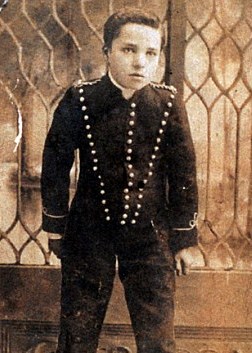Charlie Chaplin
Charlie Chaplin was a British director, actor, and composer who became one of the most iconic figures in the silent film era. Born Charles Spencer Chaplin on April 16, 1889, in London, England, he rose to fame in the early 20th century and is best known for his character "The Tramp." His career spanned more than 75 years, from the Victorian era until a year before his death in 1977, reflecting his ability to adapt to both the silent film era and the advent of sound films.
Early Life[edit | edit source]
Chaplin was born into a family of entertainers but his childhood was marked by poverty and hardship. After his father's death and his mother's mental illness, Chaplin was sent to a workhouse at the age of seven. Despite these early challenges, he began performing on stage as a young boy and quickly showed a natural talent for comedy and mime.
Career[edit | edit source]
Chaplin's career in entertainment began on the British stage, but he quickly moved to the United States in 1910 as part of Fred Karno's vaudeville troupe. In 1914, he made his film debut in a series of shorts for the Keystone Film Company. It was during this time that he developed his beloved character, The Tramp, a vagrant with the manners of a gentleman, easily identified by his tight coat, oversized trousers, bowler hat, and bamboo cane.
Chaplin's ability to blend physical comedy with pathos was revolutionary. Films like The Kid (1921), The Gold Rush (1925), and City Lights (1931) not only showcased his talents as an actor and a director but also highlighted his keen sense of social commentary, making him a beloved figure worldwide.
Despite the advent of sound films, Chaplin resisted speaking roles for a time, believing it would detract from the universal appeal of his silent films. However, he eventually embraced the change with The Great Dictator (1940), a satirical take on Adolf Hitler and fascism, which was both a critical and commercial success.
Personal Life[edit | edit source]
Chaplin's personal life was often the subject of media scrutiny. He was married four times and had 11 children. His relationships and political views, particularly his sympathy towards socialism, led to controversy in the United States during the era of McCarthyism, culminating in his re-entry permit being revoked while he was abroad in 1952. Chaplin then moved to Switzerland, where he lived until his death.
Legacy[edit | edit source]
Chaplin's contribution to the film industry is immeasurable. He was a pioneer in the transition from silent to sound cinema and his films remain influential to this day. In recognition of his work, Chaplin received an Honorary Academy Award in 1972 for "the incalculable effect he has had in making motion pictures the art form of this century."
Chaplin died on December 25, 1977, in Corsier-sur-Vevey, Vaud, Switzerland. His legacy endures, not only through his films but also through the numerous awards and honors bestowed upon him posthumously, including a knighthood by Queen Elizabeth II in 1975.
Navigation: Wellness - Encyclopedia - Health topics - Disease Index - Drugs - World Directory - Gray's Anatomy - Keto diet - Recipes
Search WikiMD
Ad.Tired of being Overweight? Try W8MD's physician weight loss program.
Semaglutide (Ozempic / Wegovy and Tirzepatide (Mounjaro / Zepbound) available.
Advertise on WikiMD
WikiMD is not a substitute for professional medical advice. See full disclaimer.
Credits:Most images are courtesy of Wikimedia commons, and templates Wikipedia, licensed under CC BY SA or similar.Contributors: Prab R. Tumpati, MD




